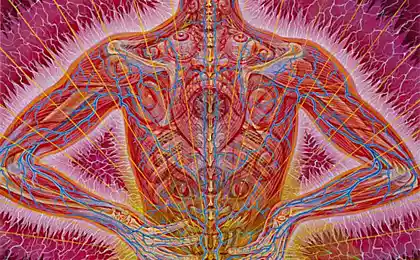164
6 character traits that indicate that you are a self-sufficient person
Self-sufficiency is not just a buzzword from the lexicon of psychologists, but a whole philosophy of life that allows a person to feel complete and happy regardless of external circumstances. It is an internal state of harmony and balance, where the source of satisfaction lies within, not in, the outside world. In modern society, where independence and individuality are so valued, self-sufficiency becomes an especially important quality that helps to overcome life difficulties and achieve goals.
In this article, we will look at six key traits that are characteristic of self-sufficient people. If you find these qualities in yourself, congratulations, you are on the right path. If not, do not worry, because self-sufficiency can and should be developed.

1. Emotional autonomy
Self-sufficient people have the ability to manage their emotions, not allowing them to take over the mind. They do not depend on the approval of others and do not need constant validation of their actions and decisions. This does not mean that they do not experience emotions or value the opinions of others, but their self-esteem does not depend on external evaluation.
How emotional autonomy manifests itself:
- Ability to accept criticism without destructive emotional reactions
- The ability to enjoy the success of others without envy and comparison
- No constant need for compliments and approval
- Stable emotional state, regardless of external circumstances
According to a study published in the Journal of Personality and Social Psychology, people with high levels of emotional autonomy exhibit higher levels of psychological well-being and life satisfaction. They are able to constructively cope with negative emotions and do not sink into depressive states when faced with difficulties.
The study was conducted by a group of scientists from Stanford University in 2021, covering more than 5,000 respondents from various social and age groups.
2. Responsibility for your life
Self-sufficient people take full responsibility for their lives, their decisions and their consequences. They are not prone to victimized behavior and do not seek to blame for their failures. They understand that they are the authors of their lives and have the power to change what they do not like.
Practical manifestations of acceptance of responsibility:
- Ability to admit mistakes without self-flagellation
- Finding solutions instead of excuses
- Active life position instead of passive waiting
- Willingness to act and make decisions, even in the face of uncertainty
Acceptance of responsibility is closely related to the concept of an internal locus of control – a psychological attitude in which a person believes that everything that happens to him depends mainly on his own actions and decisions, and not on external circumstances or other people.

3. A healthy attitude towards loneliness
Self-sufficient people are not afraid to be alone with themselves and do not experience discomfort from loneliness. They are able to enjoy their own company and use the time spent alone for self-discovery, self-improvement and energy recovery.
Signs of a healthy attitude towards loneliness:
- Ability to enjoy independent activities and hobbies
- No fear of spending time without company
- Ability to use time alone productively
- Balance between social activity and personal space
It is important to note that a healthy attitude toward loneliness does not mean social isolation or rejection of interpersonal relationships. On the contrary, this quality allows you to build deeper and harmonious relationships with other people, because they are based not on the fear of loneliness or dependence, but on free choice and mutual enrichment.
Studies show that people who feel comfortable being alone exhibit higher levels of creativity and are able to generate more original ideas. In addition, such people are less influenced by group thinking and are able to maintain independent judgment even under the pressure of public opinion.
4. Clear personal boundaries
Self-sufficient people know how to set and defend their personal boundaries. They respect themselves enough to say no when necessary, and do not allow others to manipulate themselves or abuse their trust and kindness.
How to set healthy personal boundaries:
- Learn to recognize your true desires and needs
- Practice polite but firm rejection when something goes against your values or interests.
- Don’t take responsibility for other people’s feelings and problems.
- Pay attention to your feelings of discomfort – they often signal a violation of your boundaries.
Clear personal boundaries are not a manifestation of selfishness, but a prerequisite for healthy and equal relationships. They avoid emotional burnout and resentment (hidden resentment), which often occur when a person systematically ignores their needs to please others.
According to psychological studies, people with well-defined personal boundaries are more resistant to stress and less susceptible to psychosomatic diseases. They also show higher levels of satisfaction with their relationship, as these relationships are based on mutual respect and recognition of each person’s autonomy.
5. Purpose and autonomy in decision-making
Self-sufficient people have their own goals and ambitions that are independent of social expectations or standards of success. They are able to determine the direction of their lives and make decisions based on their values and priorities, rather than the opinion of the majority.
Characteristics of autonomous decision-making:
- Ability to analyze information and form your own opinion
- Ability to resist external pressure and social conformity
- Willingness to go against the current, if it corresponds to inner beliefs
- Making decisions based on long-term goals, not short-term desires
The purposefulness of self-sufficient people is manifested in their ability to set ambitious but realistic goals and consistently move towards their achievement. They do not need external motivation or constant encouragement, since the main source of their motivation is internal.
Interestingly, according to the theory of self-determination developed by psychologists Edward Desi and Richard Ryan, autonomy is one of the three basic psychological needs of a person (along with competence and connection with other people). Satisfying this need is directly related to psychological well-being and intrinsic motivation.

6. Internal balance and harmony
Self-sufficient people have inner balance and harmony, which is manifested in their ability to find joy and satisfaction in everyday life, without chasing the external attributes of success or recognition. They appreciate what they have and practice gratitude.
Practices for developing internal balance:
- Regular reflection and self-analysis
- Practice Mindfulness and Meditation
- Keeping a gratitude journal
- Finding Meaning and Value in Everyday Moments
- Balance between work, rest and personal relationships
Inner balance does not mean lack of ambition or desire for the best, but rather the ability to find satisfaction at every step of the way, without postponing happiness for later. Self-sufficient people understand that happiness is not the end point of a journey, but a way to travel.
According to positive psychology research, the practice of gratitude and the ability to find meaning in everyday life significantly increase levels of subjective well-being and psychological resilience. People with high levels of internal balance cope better with stress and are more resilient to negative life events.
The path to self-sufficiency: practical recommendations
Self-sufficiency is not an innate quality, but the result of constant work on yourself and your worldview. Here are some practical tips to help you develop self-sufficient personality traits:
- Develop self-knowledge. Regularly take time for self-reflection, ask yourself deep questions, keep a diary. The better you understand yourself, your values, motivations, and needs, the less you depend on outside approval.
- Practice acceptance. Learn to accept yourself with all your strengths and weaknesses. Stop comparing yourself to others and focus on your own progress.
- Develop emotional intelligence. Learn to recognize, understand and manage your emotions. This will help you maintain emotional stability regardless of external circumstances.
- Invest in self-development. Constantly expand your knowledge and skills, this will increase your confidence in your own abilities and abilities.
- Learn to spend time alone with yourself. Start with short periods of loneliness and gradually increase their duration. Find activities that bring you pleasure and do not require the company of other people.
- Practice mindfulness. Being fully present in every moment of your life will help you find joy and fulfillment in everyday life.
Glossary of terms
Self-sufficiency
A psychological state in which a person does not depend on external factors to achieve happiness and satisfaction. People find sources of motivation, approval, and joy within themselves, not in the outside world.
Emotional autonomy
The ability to manage your emotional reactions and not depend on the emotional approval of others. It involves emotional self-regulation and stable self-esteem.
Location of control
A psychological concept that describes how a person perceives the source of control of his life. The internal locus of control means that the person considers himself responsible for the events happening to him, and the external - that responsibility is attributed to external factors.
Personal boundaries
The psychological, emotional, and physical limits a person sets in relationships with others. They determine what is acceptable and what is not in interpersonal interactions.
Social conformity
Changing a person’s behavior or opinion under the influence of real or imagined group pressure. It is manifested in subordination to norms, rules and requirements adopted in society or a particular social group.
Self-determination theory
A psychological theory developed by Edward Desi and Richard Ryan that studies innate psychological needs and their role in human motivation. According to this theory, for full functioning and well-being, a person needs to satisfy three basic needs: autonomy, competence and connection with other people.
Resentment
A psychological state characterized by repressed resentment, hidden hostility and powerless anger, which do not find direct expression. It often occurs when a person systematically ignores their needs or boundaries to please others.
Victim behaviour
The tendency to place oneself in the position of victim of the circumstances or actions of others. It manifests itself in shifting responsibility for their lives to external factors and refusal to recognize their role in the events.
7 things that will happen to you before you find your calling
How to make peace with yourself from the past when you have done many bad things























